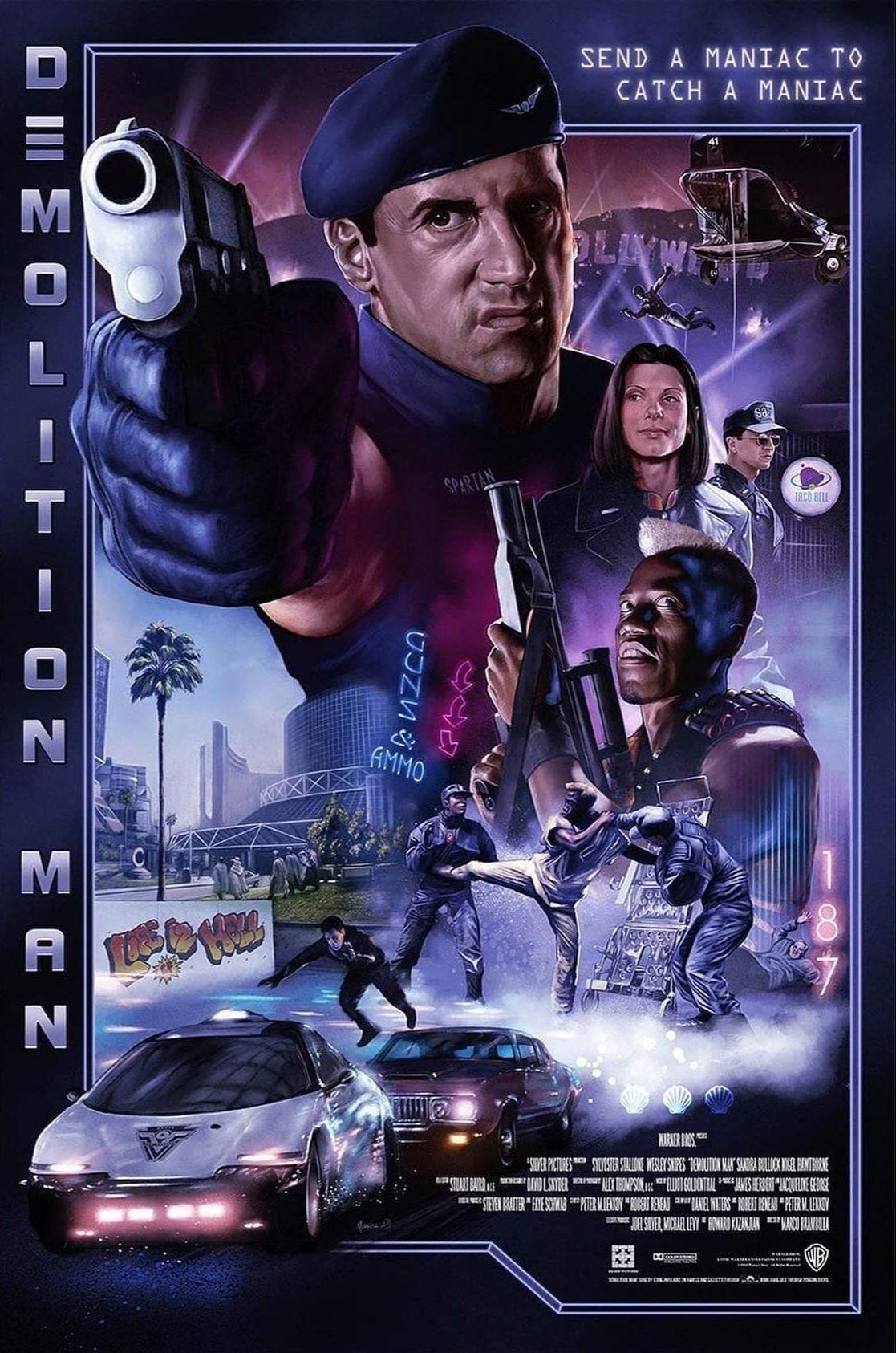"Demolition Man": Satire Served with a Side of Taco Bell
Demolition Man
1993 Director: Marco Brambilla
Starring: Sylvester Stallone, Wesley Snipes, Sandra Bullock
“Demolition Man” is a rare cinematic hybrid that tries to be everything to everybody, and impressively, manages to succeed more often than not. With Stallone’s gruff, misunderstood cop John Spartan, Snipes’ gleefully anarchic villain Simon Phoenix, and Bullock’s charmingly quirky Officer Lenina Huxley, the film is a genre-bending rollercoaster that delivers action, comedy, and social satire.
Set in the seemingly utopian Los Angeles of 2032, the film flips the script on the usual dystopian future. Instead of a grim, ruined world, we’re thrown into a society so sanitized that swearing is fined, physical contact is taboo, and Taco Bell reigns as the sole surviving restaurant. Much like the mystery meat of past fast-food franchises, the Taco Bell of the future is vegan, though no one seems entirely sure what’s actually in the food. It’s a sly wink at both fast food’s reputation for questionable ingredients and the film’s obsession with purity and safety.
Into this world are thawed two relics from the violent 1990s: Spartan, a cop with a reputation for collateral damage, and Phoenix, a criminal mastermind with a penchant for mayhem. Their explosive reintroduction to society sparks a hilarious and action-packed culture clash, as the authorities, utterly unprepared for real violence, turn to Spartan for help.
One of the film’s sharpest satirical edges is its lampooning of political correctness. This future Los Angeles is so obsessed with safety and civility that even uttering a curse word triggers an automated fine, and “offensive” language is all but extinct. The police force, more accustomed to issuing citations for bad manners than stopping real crime, is hilariously inept in the face of Phoenix’s rampage. Even the radio is sanitized, playing nothing but commercial jingles. The film takes the idea of a perfectly “safe space” to absurd extremes, poking fun at the notion that society can regulate itself into harmony by simply outlawing anything unpleasant or controversial. It’s a world where the greatest threat is not violence, but the possibility of being “unfriendly.”
The action is classic Stallone: big, brash, and unapologetically over the top. Yet what truly sets “Demolition Man” apart is its razor-sharp wit and self-aware humor. The film is packed with top-tier one-liners and clever jabs at everything from consumer culture to the cult of self-improvement. It’s both a loving spoof and a pointed satire, never taking itself too seriously but always keeping the audience engaged.
Sandra Bullock is a standout as Lenina Huxley, the wide-eyed officer who idolizes the “wild” 1990s and serves as Spartan’s guide to the future. Bullock’s comedic timing and infectious enthusiasm make her one of the film’s most memorable elements. Notably, she’s also featured in one of her rare sex scenes, though, true to the film’s playful spirit, it’s handled in a way that’s more awkwardly funny than erotic, lampooning the very idea of intimacy in a sanitized society.
As the story barrels toward its climax, the film doesn’t shy away from graphic, high-stakes confrontations. Without giving too much away, the final showdown between Spartan and Phoenix is both visually striking and thematically satisfying. The battle takes place in a futuristic cryo-prison, where the environment itself becomes a weapon. The scene is intense and inventive, featuring a memorable moment where the tables turn in a literal and metaphorical flash. Fans of explosive finales won’t be disappointed.
“Demolition Man” isn’t just an action flick, a comedy, or a sci-fi satire; it’s all of these and more. You’ll either love its wild, genre-blending ride or find it too much to handle, but one thing’s for sure: you won’t forget it. For those who appreciate a film that can poke fun at itself while delivering genuine thrills, “Demolition Man” is a cult classic worth revisiting.



